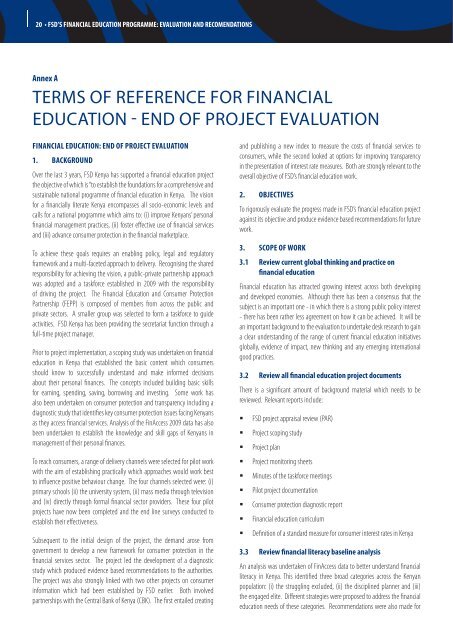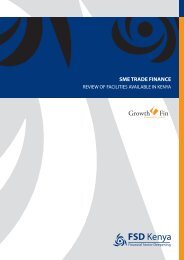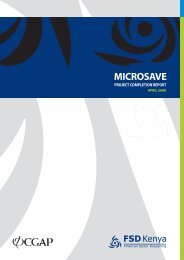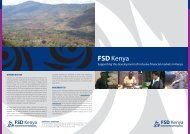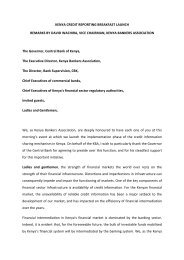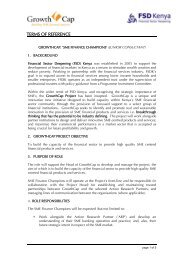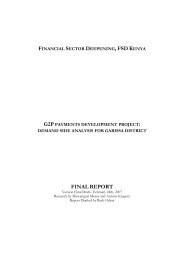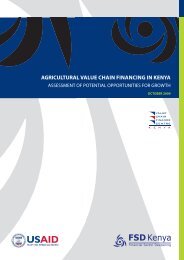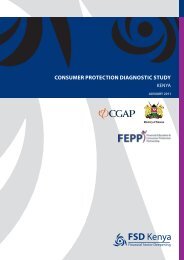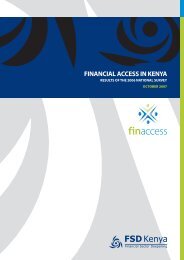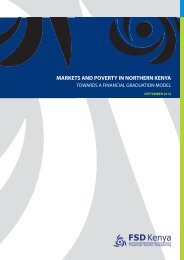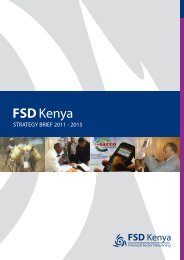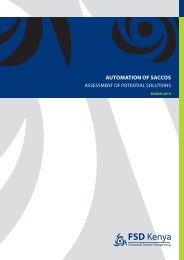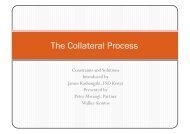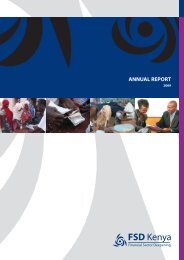fsd's financial education programme: evaluation and ... - FSD Kenya
fsd's financial education programme: evaluation and ... - FSD Kenya
fsd's financial education programme: evaluation and ... - FSD Kenya
Create successful ePaper yourself
Turn your PDF publications into a flip-book with our unique Google optimized e-Paper software.
20 • <strong>FSD</strong>’S FINANCIAL EDUCATION PROGRAMME: EVALUATION AND RECOMENDATIONS<br />
Annex A<br />
Terms of Reference for Financial<br />
Education - end of project <strong>evaluation</strong><br />
FINANCIAL EDUCATION: END OF PROJECT EVALUATION<br />
1. BACKGROUND<br />
Over the last 3 years, <strong>FSD</strong> <strong>Kenya</strong> has supported a <strong>financial</strong> <strong>education</strong> project<br />
the objective of which is “to establish the foundations for a comprehensive <strong>and</strong><br />
sustainable national <strong>programme</strong> of <strong>financial</strong> <strong>education</strong> in <strong>Kenya</strong>. The vision<br />
for a <strong>financial</strong>ly literate <strong>Kenya</strong> encompasses all socio-economic levels <strong>and</strong><br />
calls for a national <strong>programme</strong> which aims to: (i) improve <strong>Kenya</strong>ns’ personal<br />
<strong>financial</strong> management practices, (ii) foster effective use of <strong>financial</strong> services<br />
<strong>and</strong> (iii) advance consumer protection in the <strong>financial</strong> marketplace.<br />
To achieve these goals requires an enabling policy, legal <strong>and</strong> regulatory<br />
framework <strong>and</strong> a multi-faceted approach to delivery. Recognising the shared<br />
responsibility for achieving the vision, a public-private partnership approach<br />
was adopted <strong>and</strong> a taskforce established in 2009 with the responsibility<br />
of driving the project. The Financial Education <strong>and</strong> Consumer Protection<br />
Partnership (FEPP) is composed of members from across the public <strong>and</strong><br />
private sectors. A smaller group was selected to form a taskforce to guide<br />
activities. <strong>FSD</strong> <strong>Kenya</strong> has been providing the secretariat function through a<br />
full-time project manager.<br />
Prior to project implementation, a scoping study was undertaken on <strong>financial</strong><br />
<strong>education</strong> in <strong>Kenya</strong> that established the basic content which consumers<br />
should know to successfully underst<strong>and</strong> <strong>and</strong> make informed decisions<br />
about their personal finances. The concepts included building basic skills<br />
for earning, spending, saving, borrowing <strong>and</strong> investing. Some work has<br />
also been undertaken on consumer protection <strong>and</strong> transparency including a<br />
diagnostic study that identifies key consumer protection issues facing <strong>Kenya</strong>ns<br />
as they access <strong>financial</strong> services. Analysis of the FinAccess 2009 data has also<br />
been undertaken to establish the knowledge <strong>and</strong> skill gaps of <strong>Kenya</strong>ns in<br />
management of their personal finances.<br />
To reach consumers, a range of delivery channels were selected for pilot work<br />
with the aim of establishing practically which approaches would work best<br />
to influence positive behaviour change. The four channels selected were: (i)<br />
primary schools (ii) the university system, (ii) mass media through television<br />
<strong>and</strong> (iv) directly through formal <strong>financial</strong> sector providers. These four pilot<br />
projects have now been completed <strong>and</strong> the end line surveys conducted to<br />
establish their effectiveness.<br />
Subsequent to the initial design of the project, the dem<strong>and</strong> arose from<br />
government to develop a new framework for consumer protection in the<br />
<strong>financial</strong> services sector. The project led the development of a diagnostic<br />
study which produced evidence based recommendations to the authorities.<br />
The project was also strongly linked with two other projects on consumer<br />
information which had been established by <strong>FSD</strong> earlier. Both involved<br />
partnerships with the Central Bank of <strong>Kenya</strong> (CBK). The first entailed creating<br />
<strong>and</strong> publishing a new index to measure the costs of <strong>financial</strong> services to<br />
consumers, while the second looked at options for improving transparency<br />
in the presentation of interest rate measures. Both are strongly relevant to the<br />
overall objective of <strong>FSD</strong>’s <strong>financial</strong> <strong>education</strong> work.<br />
2. OBJECTIVES<br />
To rigorously evaluate the progress made in <strong>FSD</strong>’s <strong>financial</strong> <strong>education</strong> project<br />
against its objective <strong>and</strong> produce evidence based recommendations for future<br />
work.<br />
3. SCOPE OF WORK<br />
3.1 Review current global thinking <strong>and</strong> practice on<br />
<strong>financial</strong> <strong>education</strong><br />
Financial <strong>education</strong> has attracted growing interest across both developing<br />
<strong>and</strong> developed economies. Although there has been a consensus that the<br />
subject is an important one - in which there is a strong public policy interest<br />
- there has been rather less agreement on how it can be achieved. It will be<br />
an important background to the <strong>evaluation</strong> to undertake desk research to gain<br />
a clear underst<strong>and</strong>ing of the range of current <strong>financial</strong> <strong>education</strong> initiatives<br />
globally, evidence of impact, new thinking <strong>and</strong> any emerging international<br />
good practices.<br />
3.2 Review all <strong>financial</strong> <strong>education</strong> project documents<br />
There is a significant amount of background material which needs to be<br />
reviewed. Relevant reports include:<br />
•<br />
•<br />
•<br />
•<br />
•<br />
•<br />
•<br />
•<br />
•<br />
<strong>FSD</strong> project appraisal review (PAR)<br />
Project scoping study<br />
Project plan<br />
Project monitoring sheets<br />
Minutes of the taskforce meetings<br />
Pilot project documentation<br />
Consumer protection diagnostic report<br />
Financial <strong>education</strong> curriculum<br />
Definition of a st<strong>and</strong>ard measure for consumer interest rates in <strong>Kenya</strong><br />
3.3 Review <strong>financial</strong> literacy baseline analysis<br />
An analysis was undertaken of FinAccess data to better underst<strong>and</strong> <strong>financial</strong><br />
literacy in <strong>Kenya</strong>. This identified three broad categories across the <strong>Kenya</strong>n<br />
population: (i) the struggling excluded, (ii) the disciplined planner <strong>and</strong> (iii)<br />
the engaged elite. Different strategies were proposed to address the <strong>financial</strong><br />
<strong>education</strong> needs of these categories. Recommendations were also made for


